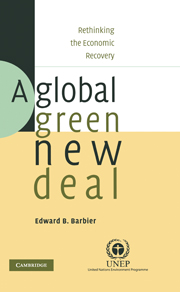Book contents
- Frontmatter
- Contents
- List of figures
- List of tables
- List of boxes
- Foreword
- Preface
- Acknowledgements
- Part I Why a Global Green New Deal?
- Part II The Key Components of a Global Green New Deal
- Part III The Role of the International Community
- 6 Promoting global governance
- 7 Facilitating access to finance
- 8 Enhancing trade incentives
- 9 Conclusion: international priorities for a Global Green New Deal
- Part IV Towards a Greener World Economy
- Appendix 1 PIIE–WRI analysis of a green recovery program for the United States
- Appendix 2 Pew comparative analysis of clean energy jobs and investments in the United States, 1998–2007
- Glossary
- Index
- References
6 - Promoting global governance
Published online by Cambridge University Press: 05 June 2012
- Frontmatter
- Contents
- List of figures
- List of tables
- List of boxes
- Foreword
- Preface
- Acknowledgements
- Part I Why a Global Green New Deal?
- Part II The Key Components of a Global Green New Deal
- Part III The Role of the International Community
- 6 Promoting global governance
- 7 Facilitating access to finance
- 8 Enhancing trade incentives
- 9 Conclusion: international priorities for a Global Green New Deal
- Part IV Towards a Greener World Economy
- Appendix 1 PIIE–WRI analysis of a green recovery program for the United States
- Appendix 2 Pew comparative analysis of clean energy jobs and investments in the United States, 1998–2007
- Glossary
- Index
- References
Summary
Improving global governance is crucial for meeting the financial, trade and policy coordination challenges to implementing the Global Green New Deal. The key question is whether there is an appropriate global policy forum that can provide the leadership necessary to overcome these global challenges and facilitate the GGND over the next several years.
To date, the most likely global policy forum for promoting urgent international action on the GGND is the G20 forum of the world's twenty largest rich and emerging economies, although all international fora, and especially the UN system, have a role to play in promoting, developing and enhancing the GGND.
There are several reasons why the G20 constitutes the appropriate environment for coordinating and innovating international policy in support of the GGND. First, the G20 has emerged as the global forum for coordinating policy action during the immediate economic crisis. The G20 is therefore well placed to consider the proposed GGND actions as part of its response to the current crisis. The indications from the Washington and London summits of the G20 are that it has the capacity to take on this role.
For example, some experts on global governance have already recommended that it do so: “The communiqué of the November 15, 2008 Summit locked in the next G20 summit and hence ordained a sequel that appears to have enshrined the G20 as the new format to address the current global financial and economic crisis over the coming months and perhaps years… [W]e strongly believe that it is best for the new US administration to focus its attention on making the G20 summit format work, in terms of its ability to address the immediate crisis, and in terms of subsequently dealing with other pressing problems, such as global warming and global poverty.”
- Type
- Chapter
- Information
- A Global Green New DealRethinking the Economic Recovery, pp. 182 - 189Publisher: Cambridge University PressPrint publication year: 2010



